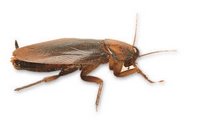One of my goals this semester has been to teach my students to critically evaluate the class content & my presentation of it. I've tried to do this in various ways, including, as mentioned in the previous post, by rewarding them (in a small manner) when they successfully challenge me.
I was reminded of how much influence that professors have over students' thinking (the power of the podium?), and the correspondingly great need to do the above, when I was teaching about cockroaches last week.
Robert Zajonc (1969) did a fun study demonstrating the social psychological principle of social facilitation--the idea that we perform better (or sometimes worse, and then it's social interference) when others are watching us. What made this study noteworthy was that he used cockroaches. He trained cockroaches to run down a clear tube toward a light (running toward the light, isn't this a basic principle of spiritual life), and he found that they ran faster when their fellow cockroaches were visible.
Well, I was drawing the set-up of the study on the class whiteboard, and in doing so I drew (badly) a cockroach that I referred to as "he." Then, commenting on my unnecessary use of gendered language, I joked that as we know, "all cockroaches are males," and went on with my lecture.
At the end of the class, one of the students remarked on the interesting fact that they had learned about cockroaches... it turns out that about half the class believed me that all cockroaches are male (which, I suppose is different than all males being cockroaches), and they thought that was really cool, though they wondered (as would I) how cockroaches procreate. One student was looking forward to sharing this interesting fact with his roommates.
Now, the students in this class are pretty bright, so the point of here isn't "oh those college students today!" Rather this story reminds me of how powerful is the role of teacher, and how we have to educate our students to be informed consumers of the knowledge that we and others give them. Not that all teachers are as confused about basic biology as I seem to be, but we all have our inaccuracies and biases that surely come through in our teaching.
I'm not sure how this fits with the pulpit, but it seems that it would. If a college professor has some authority, how much more someone reporting to speak for (or at least represent) God? Even the best-intentioned, most well-informed preacher will get it wrong sometimes, and so it seems important to explicitly teach those in the pews to think clearly about what's being told to them. How much, if at all, should this be done, and, if so, how? Certainly one can go too far and create a culture full of deconstruction and void of faith, so there is a balance here, but--having driven 14 hours yesterday (back from Thanksgiving in Indiana)--I can't get this line of thought much beyond the questions.

Ha. Pop used to tell his intersession classes that the greatest state in the Union is Montana. He'd look to see most of the foreign exchange students writing this down.
ReplyDeleteAs far as your post here, I think you have illustrated what many consider to be the great weakness of Christianity. Whether it be the instituionalized biases of the older religions, or the one-off biases of the megachurches that are built on the personalities of a Warren or a Beshore or a G.L.
Earthen Vessels, IMO.
Nice looking picture, John!
ReplyDeleteIsn't there an old Doonesbury cartoon of a professor saying the most outrageous things & students writing it down? I remember seeing it on my professors' doors at Davis.
B